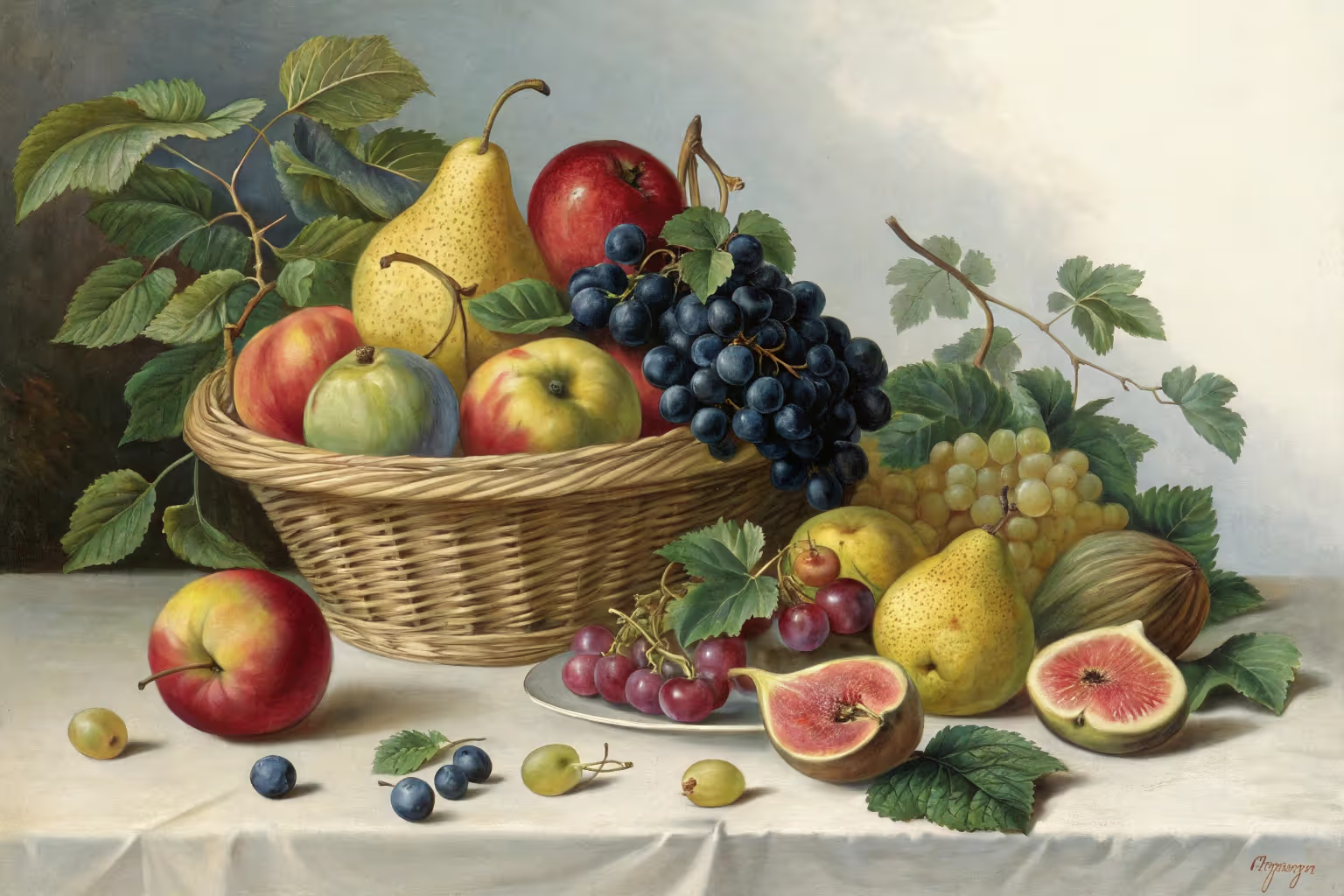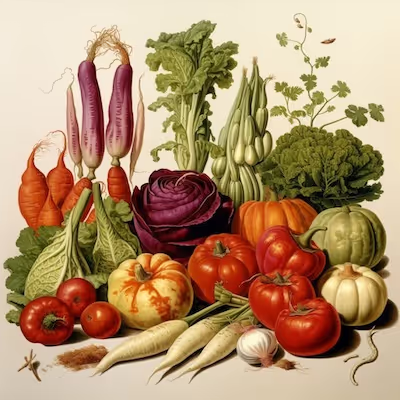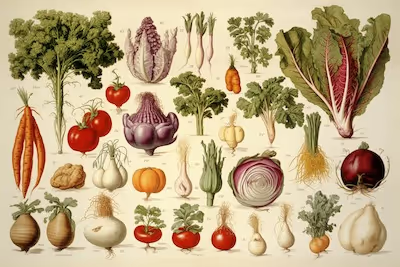Seasonal Fruits: Enjoy Fresh Flavor from Spring to Winter

Seasonal Fruits
Pick ripe seasonal fruits to taste peak flavor, boost nutritional value, and support local farms. Knowing which seasonal fruits flourish month-by-month lets you plan meals, preserve freshness, and cut waste. Follow this guide to savor seasonal fruits at their juiciest and most vibrant, every season of the year.
Cheatsheet: How to Savor Fresh Fruit All Year
🌱 Spring: Plant & Harvest
- Plant: Strawberries, cherries, apricots, rhubarb.
- Harvest: Citrus (late), early strawberries. Prune dead wood.
- 20% more vitamin C than supermarket off-season picks.
🌼 Summer: Pick & Preserve
- Pick: Peaches, plums, melons, berries, figs.
- Preserve: Freeze berries; dry apricots; make jam. Store at 32-35°F (0-2°C).
- Locally picked equals up to double antioxidant content.
🍁 Autumn: Late Harvest & Storage
- Harvest: Apples, pears, grapes, persimmons, pomegranates.
- Store: Keep apples at 30-32°F (-1–0°C) for months. Check for spoilage weekly.
- Home-stored apples stay fresh up to 5 months.
❄️ Winter: Savor & Extend
- Eat: Stored apples, pears, citrus (in season), frozen/dried fruits.
- Extend: Use covered cloches for late strawberries. Prune dormant trees.
- Winter fruit boosts immunity; citrus provides 90% daily vitamin C.
🍴 Health & Nutrition Boost
- Peak-season fruit contains 35% more phytonutrients.
- Supports gut health, heart health, reduced food miles.
- Saves money—homegrown or local costs 30% less in season.
🛠️ Tools and Products You'll Need
- Pruners & shears
- Harvest basket or crate
- Reusable produce bags
- Freezer-safe containers or canning jars
- Produce storage bins (vented)
- Organic mulch
- Fruit tree fertilizer
- Labels for preserved fruit
I plan my year around fruit the way chefs plan around tides. Seasonal Fruits keep me honest, because the calendar never lies and flavor follows it like a shadow.
Strawberries, early cherries, mulberries, and low-chill apricots fire the starter pistol, while blueberries kick in as soils warm to about 55 F or 13 C. I net low shrubs early since birds find red fruit from across the zip code.
I track chill hours so bloom syncs with bees, using the simple 32 to 45 F range or 0 to 7 C count. UC ANR notes that many peaches need 400 to 900 hours, and I pick low-chill cultivars where winters run short.
Late frost steals spring fruit faster than any insect. I throw frost cloth at dusk when forecasts flirt with 30 F or minus 1 C, and I irrigate before sunrise to ride the latent heat bump.
Pick at dawn for higher turgor and better shelf life. Then eat one in the rows, because data tastes better with juice on your wrist.
USDA: pollinators underpin about one in three bites of food we eat and add billions in crop value each year.
Peaches, plums, nectarines, figs, brambles, and melons run the show. I carry a hand refractometer and track Brix because sugar plus acid equals flavor, not sugar alone.
- Mulch 3 to 4 inches deep, or 7 to 10 cm, to blunt heat spikes and hold moisture.
- Lay reflective mulch under low canopies to color fruit on the shady side.
- Use 20 to 30 percent shade cloth during heat waves above 100 F or 38 C to save berries and plums from sunburn.
- Thin hard and early so leaves can feed the chosen few, not the whole crowd.
Regulated deficit irrigation near harvest can lift soluble solids in stone fruit, but it punishes trees if mistimed. UC Davis work supports the practice in orchards, so I copy the spirit at garden scale with careful soil checks and short cycles.
Spotted wing drosophila ruins soft fruit late in the season. I rotate clean harvests, tight netting, and quick chilling within one hour below 40 F or 4 C, which slows the party the flies want to throw.
Apples, pears, grapes, late figs, persimmons, and pomegranates deliver flavor with backbone. I pick European pears green at physiological maturity, then ripen them at 60 to 70 F or 16 to 21 C to avoid grit and brown centers.
Know your fruit’s respiration type. Climacteric fruit like apples, pears, and persimmons keep ripening off the plant thanks to ethylene, while nonclimacteric fruit like grapes, citrus, and cherries do not.
- Store ethylene makers away from leafy greens and berries.
- Hold apples and pears cold and humid, but keep grapes drier to avoid mold.
- Freeze surplus berries flat on trays, then bag, to avoid a single fruit brick.
Citrus sweetens as nights cool, and the best fruit carries winter light inside the peel. In my shed, apples sit in vented crates at 30 to 32 F or minus 1 to 0 C with 90 to 95 percent humidity.
University Extension guidance: apples store best near 30 to 32 F with very high humidity; one degree warmer or drier cuts storage life fast.
Persimmons split the room, which I enjoy. Fuyu types eat crisp, Hachiya types go custard-soft only after tannins drop, and both taste like holiday sunlight.
Sunlight on fruiting wood sets color, terpene aroma, and sugar. I run open center on stone fruit, central leader on pome, and I keep scaffolds at angles that do not snap under August load.
A south-facing wall buys a half zone of heat. Plant figs, pomegranates, and late tomatoes there, and paint trunks white to prevent winter sunscald on clear, cold mornings around 15 F or minus 9 C.
High potassium near ripening feeds sugar transport, while calcium early hardens cell walls for storage. I spoon-feed with compost teas and a light hand, since excess nitrogen fattens leaves and washes out flavor.
Blueberries want acidic soil, pH 4.5 to 5.5, airy yet moist. I top with pine fines, irrigate with captured rain, and never let the root zone swing like a pendulum.
Grafting lets me stack flavor flights on one trunk and match vigor to my space. Dwarf apples on G.935 or M26 stay reachable, while M111 runs big and tolerates rough soil.
- Spring stars: ‘Flavor Supreme’ pluot for perfume, ‘Royal Lee’ cherry in low-chill regions, ‘Earliglow’ strawberry for early punch.
- Summer hitters: ‘Indian Free’ peach for color and acid pop, ‘Lapins’ cherry for self-fertility, ‘Brown Turkey’ fig for repeat waves.
- Autumn classics: ‘Honeycrisp’ for snap, ‘Goldrush’ for storage and zing, ‘Seckel’ pear for tiny bombs of caramel.
- Winter glow: ‘Fuyu’ persimmon for crisp slices, ‘Hachiya’ for spoon desserts, ‘Meyer’ lemon for fragrant kitchens.
Cross-pollination matters for many apples and plums. I check bloom groups and dodge triploid apples as sole trees, or I add a compatible partner within bee range.
- Hand refractometer for Brix checks, rinse with distilled water after use.
- Bypass pruners and padded picking bags that spread weight across shoulders.
- Stackable vented crates, 20 to 40 liter, for fast field heat removal.
- Soft fruit cups and paper wraps for apples to stop bruising and cross-odor.
- pH meter and salt meter for brines and syrups when preserving.
For drying, the National Center for Home Food Preservation recommends 135 to 140 F or 57 to 60 C for fruit. I finish leathery, cool, then condition in jars one week before sealing tight.
I freeze berries within an hour, dry nectarines at peak scent, and pack citrus curd in small jars to avoid waste. I also pressure-can pears in light syrup and keep labels with harvest date, Brix, and tree name, because memory lies in February.
FAO estimates roughly one third of food produced for people is lost or wasted each year, about 1.3 billion tons.
- Spring: fire blight on pears and apples after warm, wet bloom. I prune out strikes 8 to 12 inches or 20 to 30 cm below the canker and sterilize between cuts.
- Summer: brown rot on stone fruit during humid spells. I thin for airflow and spray kaolin clay ahead of rain, which also confuses pests.
- Late season: codling moth on apples and pears. I hang mating disruption ties in May, bag select fruit, and pick fallen windfalls twice weekly.
Sanitation beats heroics. I compost hot, bury deep, or trash infested fruit so next year is not a sequel.
USDA hardiness zones sketch the big picture, but wind, slope, and walls rewrite it in your yard. I keep notes on frost pockets, bloom dates, first color, and flavor peaks, then replant the winners closer to my kitchen path.
- Low tunnels get me strawberries two weeks earlier and protect blossoms from spring squalls.
- Removable caterpillar tunnels keep birds out of blueberries and shed hail.
- Row covers buy a few degrees on cold nights, paired with water barrels that warm to 70 F or 21 C by day.
The grove is a small weather station. I stash digital sensors at canopy height and soil probes at 6 inches or 15 cm to guide irrigation instead of arguing with the sky.
- Bare-root vs container: bare-root ships winter dormant and establishes fast, container trees give instant canopy but can be rootbound. I buy bare-root in December to March, plant the day the box arrives, and prune to balance roots and shoots.
- Organic vs conventional nursery stock: I focus on certified disease-free trees, then I run an organic program at home.
- Where to buy: order early for in-demand cultivars and rootstocks, and check chill hour fit before you click.
- Tools worth paying for: sharp pruners with replaceable blades, a sturdy orchard ladder, and real bird netting, not tinsel.
For citrus indoors, I choose dwarf trees, the brightest south window, and a fan to move air. Keep nights above 55 F or 13 C to avoid sulking.
Rain within a week of harvest dilutes stone fruit and cracks skins, so I pick a day earlier and finish ripening on the counter. Fruit quality peaks in hours, not days, and the best mouthful often happens between the tree and the bucket.
As Anthony Bourdain said about food and risk, flavor likes living near the edge. I taste a fruit from each tree before picking the rest, because sugar talks but acid sings.
- Columnar apples on dwarf roots for patios and tight courtyards.
- Day-neutral strawberries in gutter planters for spring through fall snacking.
- ‘Fuyu’ persimmon as a compact winter treat with minimal mess.
- Raspberry primocanes in pots for two crops with simple pruning.
- Meyer lemon in a rolling tub for winter windows and summer patios.
Dynamic and Utah chill models can disagree in warm winters, so I plant a spread of chill needs as insurance. I also graft insurance limbs onto established trees, which turns every trunk into a tasting menu.
Ethylene scrubbers and produce bags slow ripening in the fridge. I keep one drawer for ethylene makers and another for delicate fruit that bruises if you look at it funny.
- March to April: strawberries, early loquats, greenhouse figs.
- May to June: cherries, mulberries, late strawberries, early blueberries.
- July to August: peaches, plums, nectarines, blackberries, melons, figs.
- September to October: apples, pears, grapes, late figs, pomegranates.
- November to February: citrus, persimmons, kiwis, storage apples and pears.
Seasons slip by latitude and altitude, but the sequence holds. I plant to hit each window with at least two fruits so something always tastes like now.
USDA Plant Hardiness Zone Map for baseline planning. UC ANR and UC Davis for chill, canopy, and irrigation research that survives real weather.
National Center for Home Food Preservation for safe drying and canning. FAO for waste data that reminds me to pick, preserve, and share on time.

Want smarter plant choices? 🪴
Frequently Asked Questions About Seasonal Fruits
How do I identify truly ripe seasonal fruits at farmers' markets?
Trust your senses. Ripe fruits often exude enticing aromas, offer a slight yield to gentle pressure, and flaunt vibrant color. Steer toward produce that tempts the senses rather than polished perfection.
Can seasonal fruits enhance the flavors in my cooking?
Absolutely. Matching your dishes to the rhythm of seasonal harvests invigorates the palate and showcases fruits at peak flavor. Grilled stone fruits, autumn pear tarts, or zesty winter citrus salads exemplify dishes thriving on seasonal synergy.
What's the best way to store seasonal fruits at home?
Respect the fruit's temperament. Soft berries appreciate open air in shallow containers, whereas crisp apples and pears prefer cool, ventilated spaces. Tropical fruits ripen luxuriously at room temperature before refrigeration slows their sweetness.
Can seasonal fruits be preserved without losing their vibrancy?
Yes, preservation techniques like pickling, fermenting, drying, and freezing capture the transient essence of seasonal fruits. Imagine tasting sun-dried figs in winter or spooning homemade strawberry jam as snow falls—a vibrant reminder of warmer days.
Are organically grown seasonal fruits worth seeking out?
Absolutely. Organically cultivated fruits provide nuanced flavors absent in commercially grown counterparts. They offer authentic taste experiences, carrying the soil's unique character straight to your table.
How can I incorporate lesser-known seasonal fruits into my meals?
Explore boldly. Persimmons, quince, pawpaws, and gooseberries—each fruit offers unexplored culinary possibilities. Experiment freely: blend into sauces, roast alongside poultry, or fold into pastries to coax out hidden complexities.
Each season brings its own fruits, and nothing beats the flavor of something picked at its peak. By tuning into the rhythm of seasonal fruits, you get produce that’s fresher, tastier, and often more nutritious. Growing your own or shopping local means you’re eating what nature intended for that time of year. If you’re curious about mixing in some veggies with your fruit harvest, check out this food garden guide for inspiration. Remember, savoring seasonal fruits isn’t just about taste—it’s about connecting to the land, the weather, and the simple pleasure of eating what’s truly in season.
Seasonal Fruits and Your Health: Nutrients That Nourish Year-Round
Spring: Strengthen Immunity with Early Fruits
- Strawberries: Vitamin C (89 mg per 150g) enhances immunity, supports collagen formation.
- Apricots: Beta-carotene provides eye health protection and reduces cardiovascular risk.
- Cherries: Rich in anthocyanins, reducing inflammation and muscle recovery time.
Summer: Hydrating and Protective Fruit Nutrition
- Watermelon: 92% water content replenishes hydration; lycopene supports heart health, reducing stroke risk by nearly 19%.
- Peaches: Potassium (285 mg/medium peach) balances electrolytes and regulates blood pressure.
- Blueberries: Antioxidant benefits slow cognitive aging by approximately 2.5 years.
Autumn: Boost Immunity and Prepare for Cooler Months
- Apples: Soluble fiber (pectin) aids digestion and lowers LDL cholesterol.
- Pears: High fiber content (over 5g per medium pear) promotes gut microbiome health and regulates appetite.
- Figs: Calcium (50 mg per 100g) contributes to stronger bones, especially valuable as sunlight exposure decreases.
Winter: Maintain Vitality Despite Lower Temperatures
- Citrus Fruits (Oranges, Grapefruit): Vitamin C reduces duration of winter colds by 8%–14%.
- Pomegranates: Antioxidants decrease oxidative stress, supporting immune defense during flu season.
- Kiwis: Vitamin E and potassium content enhance cardiovascular health amid colder weather.
Enhance Nutrient Absorption from Seasonal Fruits
- Pair fruit with healthy fats: Combine berries with nuts or avocado slices; enhances fat-soluble nutrient uptake.
- Minimize peeling: Consume edible peels (apples, pears) to obtain maximum fiber and antioxidants.
- Timing matters: Eat fruit post-meal to stabilize blood sugar and maximize nutrient assimilation.
Find out which plants will thrive in your garden!
Answer a few fun questions and get custom plant recommendations perfect for your space. Let’s grow something amazing together!

start your season





